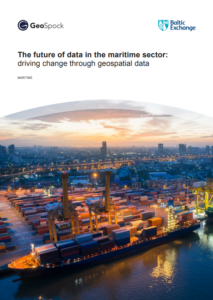In August the Baltic Exchange collaborated with GeoSpock, a geospatial big data company, to build a maritime spatial database. The partnership aims to enable the continued provision of independent, impartial assessment of the maritime industry.
Now, the two parties have launched a document called ‘The future of data in the maritime sector: driving change through geospatial data‘, describing the partnership’s vision in detail.
The first project that is being assessed is a maritime air emissions programme, which will gather data from various sources to supply the industry with a better understanding of vessel emission profiles.
Commenting on the announcement, Baltic Exchange CEO, Mark Jackson, stated:
It is imperative that we adopt and utilise the most advanced technology and develop the most holistic database available to our industry … The database we are building with GeoSpock will act as a hub of information that can be constantly added to and improved on, but more importantly, interacted with. We believe it will set a global standard for a stronger data strategy in the shipping industry
[smlsubform prepend=”GET THE SAFETY4SEA IN YOUR INBOX!” showname=false emailtxt=”” emailholder=”Enter your email address” showsubmit=true submittxt=”Submit” jsthanks=false thankyou=”Thank you for subscribing to our mailing list”]
Currently, shipping generates large amounts of data, whether it is on board vessels, in port, or through the wider logistics chain. Now, this data is separated, with no central pool that the industry can use, the Baltic Exchange says.
This new initiative aims to change that, and in addition to data specific to shipping emissions, like fuel usage, voyage route and journey time, wider information on details such as location and weather will also be captured.
These datasets will enable the industry to make better informed decisions when developing emissions initiatives. Companies will also be able to analyse and improve shipping on a global scale, while at the same time providing regulators and governments with a new level of transparency.
The datasets and data science tools will be designed and built by GeoSpock. The GeoSpock Spatial Big Data platform, built on AWS Cloud, will be able to provide context to huge quantities of global maritime data provided by Baltic Exchange members and industry participants.
Check more details in the PDF below





























































